Vancouver’s Global Competitiveness for ESG Investment
This study uses ESG metrics to assess the competitiveness of Vancouver’s economy against comparable cities around the world.
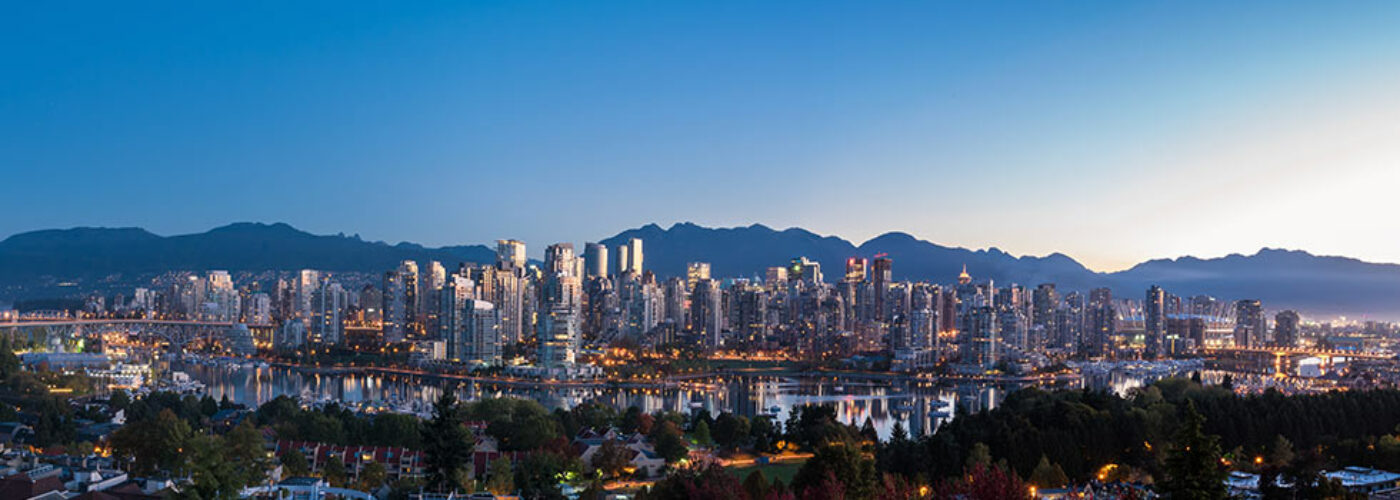

Vancouver Economic Commission (VEC), with the support of CanExport, commissioned Delphi Group to complete a study that uses ESG metrics to assesses the competitiveness of Vancouver’s economy against comparable cities around the world. These findings make the case that there is no greater place to invest than Vancouver – particularly for companies with similar values to advance climate action and achieve a zero-emissions economy.
Why ESG? An ESG approach identifies metrics that can be used to understand a city’s competitive advantages in relation to both capital and operational investment attraction.
Vancouver performs near the top (#2) compared to global peers on cost of energy for households. With 97% of Vancouver’s electricity produced from renewable resources, Vancouver benefits from energy that is affordable as well as clean. Outlined in the Renewable City Action Plan, the city plans to become entirely powered by renewable energy by 2050.
Vancouver International Airport (YVR) has ambitious climate-related targets, with a goal of achieving net-zero carbon emissions by 2030. Over the next decade, the airport will invest $135 million into net-zero commitments.
While Vancouver didn’t rank high in the sustainable mobility metric, TransLink’s 2050 Strategy will improve sustainable mobility options for the city and region. It’s worth noting that Arcadis’ sustainable cities mobility index (2017) ranked Vancouver #8 (out of 100) for efficiency and reliability.
While Vancouver struggles with many social inequities like other global cities, on average it offers a high quality of life when compared to peer cities, with strengths in access to greenspace, sustainable transportation and low air pollution. It is important to note that while Vancouver has a relatively high ratio of quality of life to cost of living, it remains among the most expensive cities in Canada, especially in terms of housing.
Vancouver’s largest university, the University of British Columbia (UBC), ranks high (#3) amongst global universities for university reputation. Notable programs include sustainable education grants, a sustainability scholarship program, and a climate emergency task force.
BC just passed pay transparency legislation that will enter into force in November of 2023; while this may not immediately shift performance in this area, progress is more likely and can be amplified over time.
Vancouver has several initiatives and resources for businesses to incorporate circular practices into their operations (such as VEC’s “Right to Food” framework), though government support and a formal plan are necessary to elevate these activities under a cohesive strategy.
Vancouver is a leader amongst global cities when it comes to climate action. It was one of the first cities in the world to declare a climate emergency, and created a Climate Emergency Action Plan (CEAP) outlining action areas such as land-use planning, transportation, building, infrastructure, and natural systems. VEC’s Zero Emissions Economic Transition Action Plan (ZEETAP) outlines specific actions to support climate initiatives outlined in CEAP.
Vancouver is known for attracting talent and capital across a variety of cleantech solutions, from carbon capture to ocean robotics. The city placed #16 in Startup Genome’s top 35 cleantech ecosystems worldwide and ranks high on knowledge, with room to grow across funding, startup experience, talent and focus. Programs are already in place to move the dial in these areas, including VEC’s Angels for Climate Solutions program and Project Greenlight.
E = Environment, S = Social, G = Governance 
n/a* = The calculation of GHGi/kWh for each city is complex and out of the scope of this project
*see report for more information
P. T. = pay transparency
Yes & Yes = have declared a climate emergency and have a city climate action plan in place
Sources are available in the full report
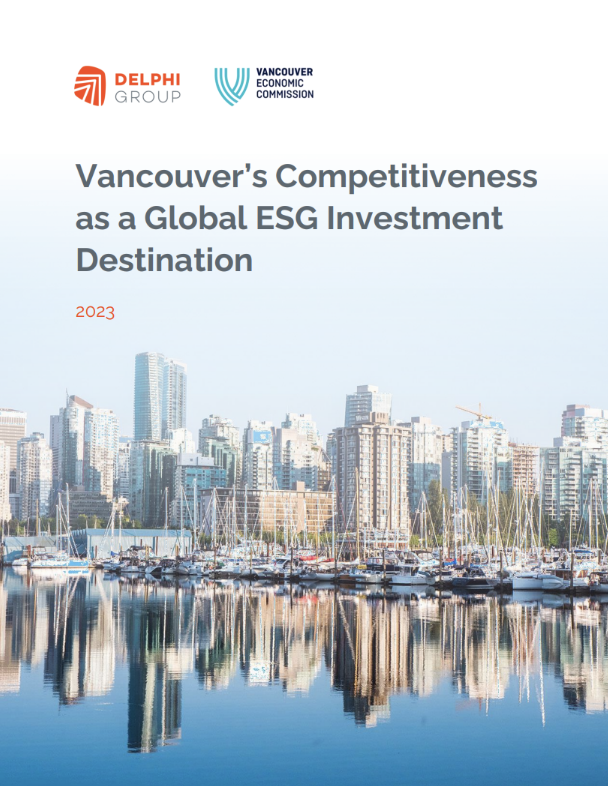
To gain a deeper understanding of how Vancouver’s competitive strengths can inform long-term investment decisions, download a copy of the report today.
Download [PDF]
Or, if you have questions about the data or about potential investment opportunities, send us an email.
Published: May 2023
Author: Delphi Group
Vancouver is a globally competitive city to invest in both because of, and beyond, its ESG competitiveness. VEC has a long history of supporting investment in the city. To learn more, refer to our resources below:
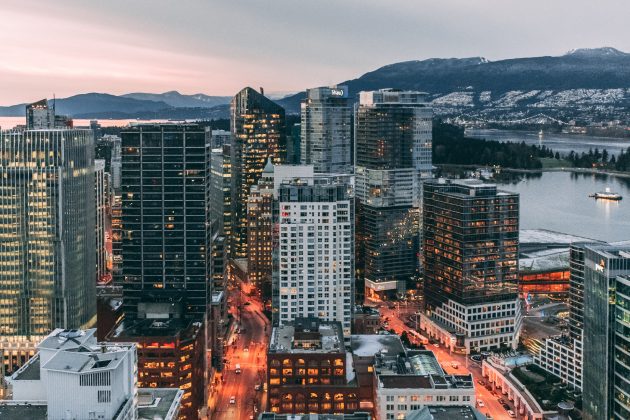
Essential legal, tax and market information for cross-border investment into Vancouver, Canada. Download your free copy today.
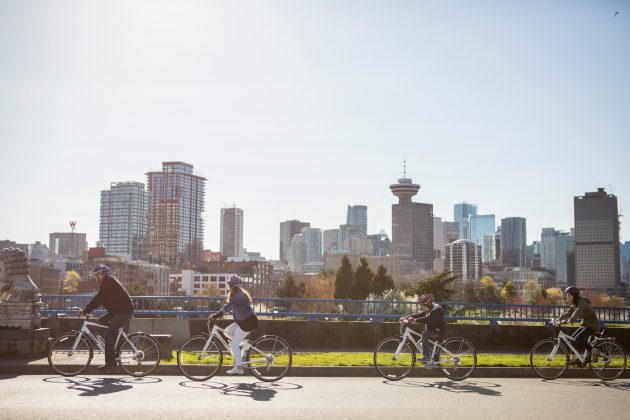
Are you considering your next move in Metro Vancouver? This guide collates data from numerous reputable sources to generate a realistic snapshot of the affordability landscape and make it easier for you chart your best path forward.
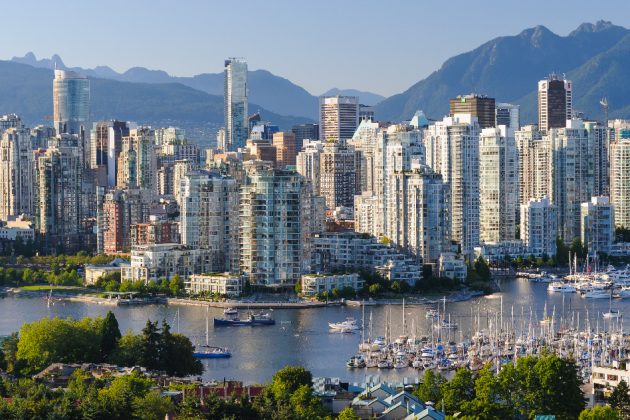
A quarterly report showcasing local sectors, perspectives on 21st century economics and ideas on future-proofing our economy.
The City of Vancouver’s climate action plan that outlines how the city will reach necessary carbon pollution reduction targets
ZEETAP aims to help businesses and individuals address challenges related to the just and equitable transition to a zero-carbon economy
The circular economy is an economic model that extends the life cycle of products. See how Vancouver aims to effectively design out waste in a closed system.
The Vancouver Economic Commission respectfully acknowledges that it is located on the unceded territories of the xʷməθkʷəy̓əm (Musqueam), Sḵwx̱wú7mesh (Squamish), and səl̓ilwətaɁɬ (Tsleil-Waututh) Nations.